SWITZERLAND
History

History

Cities in SWITZERLAND
| Bern | Zurich |
History
Earliest History and Roman Times
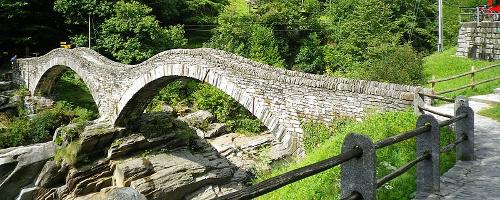 Roman bridge in Ticino, SwitzerlandPhoto: Glcastellanos99 CC 3.0 Unported no changes made
Roman bridge in Ticino, SwitzerlandPhoto: Glcastellanos99 CC 3.0 Unported no changes made
Switzerland was already inhabited by hunters in caves about 10,000 years before Christ. In the Jura, objects have been found that indicate this. About 8000 BC, people spread across the plains created after the melting of the glaciers. Approx. 6000 BC peoples from the Middle East settled in Switzerland.
They founded primitive settlements and made a living from agriculture. Before that, they cleared forests and land was reclaimed. The important Tène culture arose in the Iron Age, ca.800 BC. For example, the first coins came into circulation in the Tène period. The people from this culture lived, among other things, in stilt houses. One of the Celtic tribes that spread across Switzerland from southern Germany was the Helvetes. Their spread was halted by Julius Caesar in 58 BC. From 15 BC the Helvetes were definitively subdued and the Roman province of Helvetia was a fact. From the camps of the Romans gradually emerged large cities that were inhabited by both Romans and Celts. Until the 3rd century people lived peacefully side by side in a reasonable prosperity. In the 4th and 5th centuries, raids by Germanic tribes from the north caused the fall of the Western Roman Empire.
Middle Ages
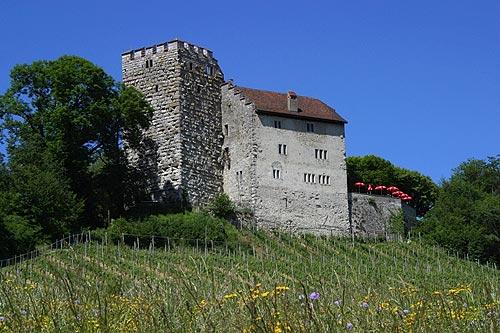 Habitsburg, medieval castle of the Habsburgs in SwitzerlandPhoto: Roland Zumbühl CC 3.0 Unported no changes made
Habitsburg, medieval castle of the Habsburgs in SwitzerlandPhoto: Roland Zumbühl CC 3.0 Unported no changes made
In the end, the Burgundian tribe managed to settle around Lake Geneva. After this, the Burgundians in western Switzerland founded a kingdom where the language of communication was Latin. The Alemanni, another Germanic tribe, settled in the north and east of Switzerland. Here we also see the origin of the language border arise. In 534, the territory of the Burgundians and Alemanni was conquered by the Merovingian Frankish family under the leadership of King Clovis. The Christianization of the area was also tackled energetically. In the 7th century, the Merovingians were succeeded by the Carolingians, of which Charlemagne was the best known monarch. His empire stretched from the Baltic to the Pyrenees.
After the treaty of Verdun in 843, the empire was divided into: West Francia (= now France), East Francia (= now Germany) and Middle Francia, to which present-day Switzerland largely belonged. After the death of King Lothair, Middle Francia was divided between Louis the German of East Francia and Charles the Bald of West Francia. At the end of the 9th century, the kingdom of High Burgundy was created, which included Western Switzerland and Savoy. However, the German emperor incorporated it back into the Holy Roman Empire in 1032. However, the power of the German emperor was limited by the feudal system. In the French-speaking part of Switzerland, the Duke of Savoy became increasingly powerful; in the east of Switzerland, two powerful families ruled: the Zähringers and the Kyburgers. In the meantime, the Habsburgs gained more and more power in neighboring Austria and the German-speaking part of Switzerland. With the extinction of the Kyburg family, their possessions passed to the Habsburgs without a fight. The Habsburgs appointed Austrian governors and this caused many conflicts.
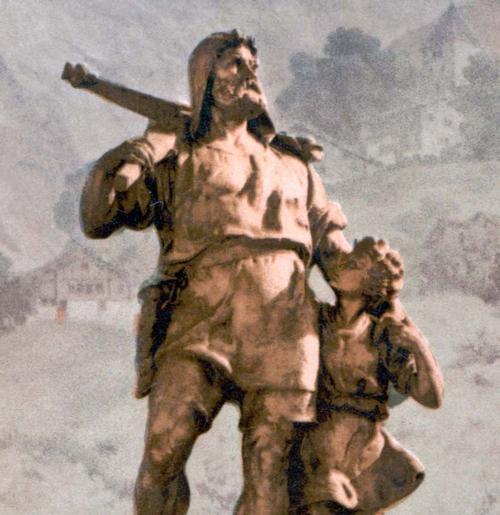
The true or false story of Wilhelm Tell also plays a role during this time. He refused to greet the hat of the Austrian governor Gessler and as punishment had to shoot an apple on the head of his son. He succeeded, but he was still imprisoned by Governor Gessler. However, Tell managed to escape and then shot Gessler. This is said to have triggered a major uprising near Lake Lucerne.
Swiss Confederation
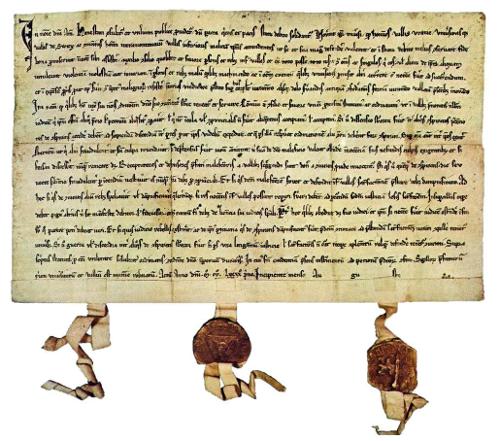 Federal letter from 1201, SwitzerlandPhoto: Public domain
Federal letter from 1201, SwitzerlandPhoto: Public domain
After the death of Emperor Rudolf I of Habsburg in 1291, several cantons united on August 1, 1291. This alliance laid the foundation for the later Swiss state, the "Confederation". Even today, August 1 is the most important national holiday in Switzerland. The covenant meant, among other things, that an attack on one of them would be interpreted as an attack on all. They also no longer wanted foreign interference in internal affairs. The covenant grew ever closer, to the anger of the Habsburgs. This led to the Battle of Morgarten in 1315, where an army of the Habsburgs was devastatingly defeated.
After this a new alliance was made, the "Ewige Bund". In the 14th century, more cantons joined the Confederation. Especially the connection of Zurich was a thorn in the side of the Habsburgs. This in turn led to two battles, both of which were lost by the Habsburgs. At that time, the Swiss territory was also attacked by Savoy and the revived Duchy of Burgundy. The new Burgundy continued to expand, but misguided the Swiss Confederation. The army of Burgundian Charles the Bold was defeated twice in one year and with the death of Charles the Bold in 1477 the Burgundian empire finally collapsed. At the end of the 15th century, disagreements arose in the Confederation caused by the contradictions between the cities and the rural areas. Civil war could hardly be avoided. The hermit Klaus von der Flüe played an important role in this and has since been called “Father of the Fatherland”. For a long time, Wallis remained a battlefield between Savoy and the bishops of Sion. Central figures in this were Walter and Jörg Supersaxo and the Valais theology student Schiner. Supersaxo supported France in its role as a European power, Schiner supported the alliance between the Pope's Rome and the German Empire.
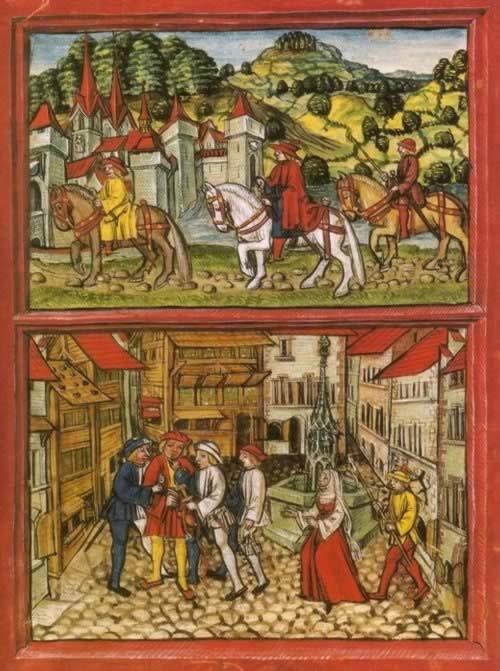
In 1513 Milan was conquered from the French, Schiner was made cardinal and Tircino and Locarno were incorporated into the Confederation. Alliances were also entered into with Geneva and Graubünden. In 1515 the Swiss were crushed by the French. This led to a peace treaty with France that would last “forever”, and stipulated that the Confederacy would never again seek to expand territory. This treaty would form the basis for Switzerland's policy of neutrality that has lasted for centuries. The time of the Reformation did not leave Switzerland untouched either. The authority, rituals and customs of the Catholic Church were rejected by the Reformers. Again, there was a contrast between the cities and the countryside. The inhabitants of the cities liked the ideas of the Reformation, the rural areas felt threatened by it. The well-known reformist Zwingli also wanted to reorganize the Confederation. This led to a religious war at Kappel in 1531 in which Zwingli died and the Catholics won. Another reformer, the Frenchman Calvin, settled in Geneva, which broke away from Savoy in 1530 and formed an independent republic. Calvin became known for the extremely strict way of life he prescribed.
The Counter-Reformation started around 1550 and until the beginning of the eighteenth century the conflicts between the Catholic and Protestant cantons dominated the history of Switzerland. The 30-year war ended with the “Peace of Westphalia”. In this treaty, Switzerland was first mentioned as a European nation and its independence from the German Empire was recognized. Meanwhile, conflicts between farmers and townspeople continued. In 1653 this cost thousands of farmers their lives. Two years later, a major conflict ensued between the Protestant canton of Bern and the Catholic canton of Lucerne. Until the beginning of the eighteenth century, the Protestants were unable to beat the Catholics. Until the Catholics lost the Battle of Villmergen and then were forced to finally divide political power fairly between the Catholic and Protestant cantons at the Peace of Aarau.
Confederation
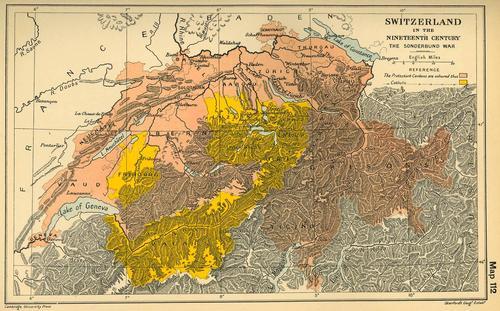
The situation changed with the French revolution at the end of the eighteenth century. The French occupied Switzerland and in 1798 formed the Helvetic Republic, a centralized state after French example. However, the French failed to get a grip on the stubborn Swiss and in 1803 the occupation troops were withdrawn. Six new cantons then joined the Confederation and nationally applicable laws were passed. However, at the Congress of Vienna (1814/1815), a decentralized state with self-governing cantons was restored. There was great confusion about how to proceed. Radical youth, liberals, aristocrats, and the differences in language and religion did not make things any easier. The Catholics united in a special alliance: the Sonderbund. The Protestants tried to prevent this, but failed.
Another war broke out and was won by the Protestant cantons led by Dufour in 1847. A new constitution was drawn up in 1848. In this, the federal parliament was given many powers, almost all religions were given equal rights and a federal court was established. It was also very important that the mutual relationships were restored and stabilized. As a result, industrialization continued strongly in the 19th century. Tourism was on the rise, roads, railways and the first tunnels were built. Banking also became increasingly important.
20th century
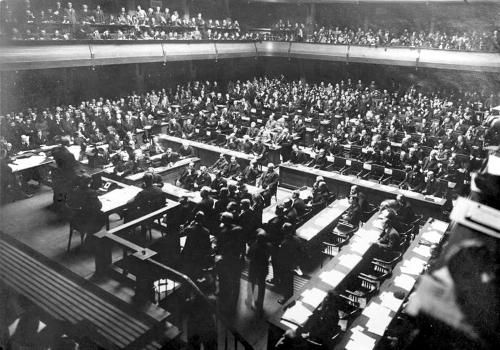 Closing session of the League of Nations in Geneva, Switzerland in 1926Photo: Bundesarchiv, Bild 102-02454 CC-BY-SA 3.0 no changes made
Closing session of the League of Nations in Geneva, Switzerland in 1926Photo: Bundesarchiv, Bild 102-02454 CC-BY-SA 3.0 no changes made
Switzerland remained neutral in the First World War. Nevertheless, the First World War did have an impact and consequences for Switzerland. The opinions of the French-speaking and German-speaking Swiss naturally clashed again. The Germans and the Allies, in turn, did not trust the Swiss very much. As a result, trade largely came to a standstill. In addition, tens of thousands of refugees came to Switzerland, causing a shortage of goods, food and labor. In 1920 Switzerland became a member of the League of Nations. This lasted until the mid-1930s when Switzerland became completely neutral again. In the Second World War Switzerland remained neutral again, but continued to trade with the Axis powers.
After the Second World War, Switzerland became politically isolated because it had not joined the Allies. The country also suffered from many strikes. Political isolation diminished with the role in the Korean War. From that time on, Switzerland would much more often play a mediating role between warring parties. Due to the strong growth of the economy, industry and banking, prosperity increased very quickly after the war.
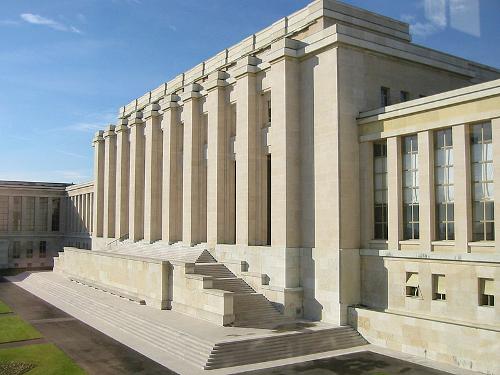 UN headquarters in Geneva, SwitzerlandPhoto: Filzstift in the public domain
UN headquarters in Geneva, SwitzerlandPhoto: Filzstift in the public domain
Switzerland's neutral position has made Geneva the seat of many international organizations such as the United Nations, Scouting, WHO, ILO, League of Nations and Red Cross. Important issues in post-war Switzerland were: women's suffrage (only in 1971) and the equality of men and women (only in 981); the pursuit of secession in the Jura, which in 1978 led to the canton of Jura, split from the canton of Bern; gigantic riots by young people in the 1980s against the establishment. Furthermore, political scandals and the ideological upheaval in Central and Eastern Europe in the late 1980s undermined the self-confidence of the Swiss. The question of whether or not to remain neutral was a major issue in these types of issues. Membership of the European Union also remained and remains a point of contention. Many politicians are in favor, but the people voted in 1992 against joining the European Economic Area (EEA). It is also significant that the elections for the Nationalrat in 1995 were won by the SPS strongly represented in the French-speaking part (before accession to the EU) and the SVP strongly represented in the German-speaking part (against accession to the EU).
In the second half of the 1990s, Switzerland was seriously discredited. And especially the banking system during the war years. In 1996 an investigation was conducted into the bank accounts of the victims of the Holocaust. The British Foreign Office found in a report that Switzerland had returned only a small portion of the gold stolen from Jews and German-occupied states. In July 1997, a number of Swiss banks published the names of foreigners who held a bank account with those institutions during World War II.
21st century
In March 2001, the Swiss people again voted against accession to the European Union in a referendum. According to the official result, 77% of voters are against a speedy start of negotiations on joining the European Union. After more than five decades, Swiss voters did vote on March 3, 2002 to join the rest of the world as a member of the United Nations. It turned out that 55% had voted for and 45% against accession. The necessary majority of the cantons (12-11) also voted in favor. Until now, Switzerland had observer status at the United Nations in the General Assembly of the United Nations. In 1986, 75% of the voters voted against membership. On September 10, 2002, Switzerland became the 190th member of the Peoples Organization immediately after the opening of the 57th United Nations General Assembly.
At the end of 2003 a political landslide took place in Switzerland due to the election victory of the national-conservative SVP led by Christoph Blocher.
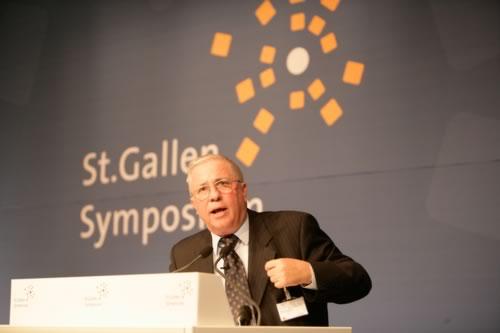
Since 1959, the federal government has been constituted by the unwritten rule that all major parties participate in a broad coalition. Two of the seven members of the Federal Council were Liberal Democrats (FDP / PRD), two Christian Democrats (CVP / PDC), two Social Democrats (SPS / PS) and one member of the National Conservative Party (SVP / UDC). In principle, this distribution key was fixed and was not sensitive to election results. Furthermore, the Federal government consisted of four German speakers, two French speakers and one Italian-speaking member. Blocher, however, demanded two seats (which also accrue to the SVP on the basis of the vote distribution) and threatened opposition if these were not awarded to the SVP.
The threat of an opposition was so unheard of that, during the vote on December 10, 2003, Parliament yielded to the SVP and included an additional member of this party in the new cabinet. This happened at the expense of one place for the CVP. The election of Blocher (SVP) and the right-wing liberal Merz (FDP) marked a shift to the right. Slimming down of the government apparatus, limiting the role of the state with the emphasis on citizens' own responsibility, reorganizing the state budget and restructuring social security systems are receiving more attention. From a foreign policy point of view, the prospect of EU membership has become even further lost. Negotiations on Bilateral II were successfully concluded in October 2004. It was approved on June 5, 2005.
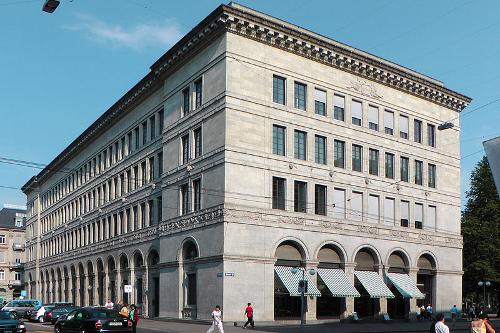 Swiss National Bank in ZurichPhoto: Myriam Thyes CC 3.0 Unported no changes made
Swiss National Bank in ZurichPhoto: Myriam Thyes CC 3.0 Unported no changes made
Central to the Bilateral II agreements is cooperation in the field of asylum and migration, and tax fraud. During the negotiations, some EU member states wanted Switzerland to give up banking secrecy. Instead, the Savings Directive will also apply to Switzerland. This means that the interest income from Swiss savings of EU citizens will be taxed and that the vast majority of this money will be passed on to the relevant EU member states. This agreement entered into force on July 1, 2005. In the October 2007 elections, the SVP receives 29% of the vote, making it the largest political party. In December 2007 the SVP left the coalition, but in December 2008 the party rejoined the government. In January 2009, Switzerland's economy was officially in recession as a result of the credit crisis. In November 2009 Swiss voters banned the building of minarets in a referendum. In May 2011, in the aftermath of the Fukishima nuclear disaster, Switzerland launched plans to become independent from nuclear energy. In 2012 and 2013, the immigration theme is hot in Switzerland. Initially these are underprivileged immigrants. In February 2014 Switzerland caused a sensation by also setting quotas for residents of the EU. This decision is seriously affecting relations between Switzerland and the EU. In January 2015, the Swiss Franc is decoupled from the Euro. This causes an increase in the Franc and possible damage to the tourism sector. In June 2016, the provision of a basic income will be agreed in a referendum. In February 2017 it was decided by referendum that obtaining citizenship would be easier for third-generation immigrants. In a referendum in May 2017 it was decided to say goodbye to nuclear energy in due course.
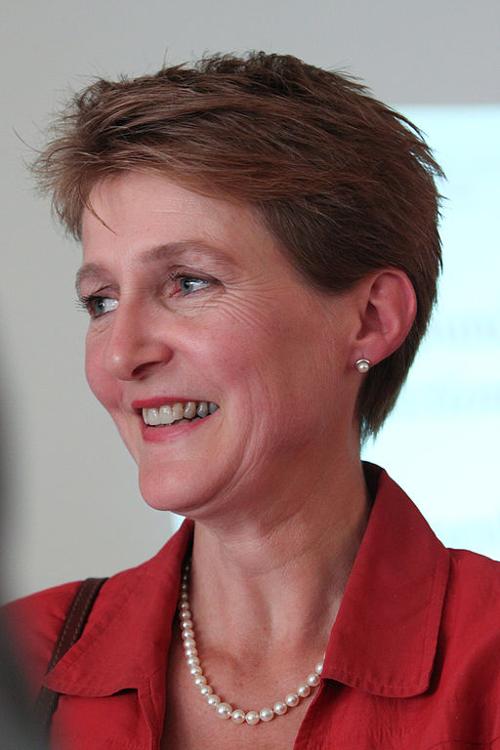 Simonetta Sommaruga, SwitzerlandPhoto: JUSO Schweiz CC 2.0 Generic no changes made
Simonetta Sommaruga, SwitzerlandPhoto: JUSO Schweiz CC 2.0 Generic no changes made
Simonetta Sommaruga will become president in January 2020, a position that changes annually. In January 2022 Ignazio Cassis will become president.
Sources
Dominicus, J. / Zwitserland
Gottmer
Lamme, M. / Zwitserland
Kosmos-Z&K
Lannoo’s autoboek Zwitserland
Lannoo
Mandos, M. / West- en Midden-Zwitserland
ANWB
CIA - World Factbook
BBC - Country Profiles
Last updated June 2025Copyright: Team The World of Info